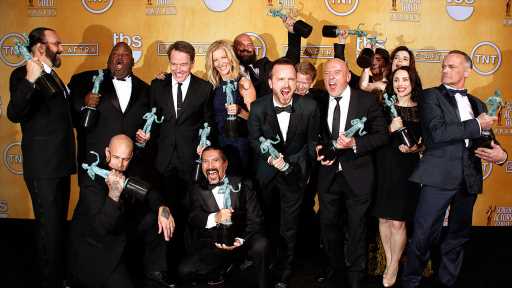Star’s fair lady: What Julie Andrews saw in this Australian Eliza
Save articles for later
Add articles to your saved list and come back to them any time.
Dame Julie Andrews has one of the most storied voices in show business: light, lilting, moving effortlessly between speech and song, each word perfectly enunciated, each note exactly perfect (she has the rare gift of absolute pitch). But for Australian soprano Anna O’Byrne, it’s a voice that’s more familiar than to most – a voice she knows almost as well as her own. “I listen to a recording of Julie and I can hear exactly what she’s doing,” she says.
There is good reason for this. In 2016, the legendary singer handpicked O’Byrne from a pool of hopefuls to play Eliza Doolittle in the 60th-anniversary production of My Fair Lady, directed by Andrews herself. In the lead-up to the production, Andrews coached O’Byrne through every breath, every note, every shimmering vibrato.
Dame Julie Andrews (right) with Anna O’Byrne and Charles Edwards as Eliza Doolittle and Henry Higgins.Credit: Margot Taylor
“She understood the role on such a cellular level – Julie’s in the DNA of My Fair Lady,” explains O’Byrne. The process of becoming Eliza Doolittle was as much a process of learning to become Andrews: “You can’t do [the role] and not pay homage to her.”
This is not to say that Andrews was a prescriptive director – meticulous, yes, and sure of what she wanted, but also willing to take a step back and let O’Byrne find her own way. “She never, ever told me how to sing, but she did tell me how to speak when I was singing,” she says. “She taught me how to use my voice to its best ability.”
O’Byrne’s connection with Andrews seems somewhat fated. Her earliest memory of falling in love with musical theatre was watching The Sound of Music on television as a girl. In high school, she appeared in an amateur production of My Fair Lady – though it was her sister who performed the lead role. At the time, O’Byrne was more concerned with music. “She played Eliza and I played violin in the pit,” she recalls. “I used to run lines with her and I remember hearing her above me, as I played.”
Years later, it was her sister who encouraged her to audition for My Fair Lady, by which point O’Byrne had already made her name as a singer, while her sister had gone into law: “She’s a barrister now; she’s got nothing to do with the performing arts in a professional sense,” says O’Byrne. “Far too wise for a life on the wicked stage!”
Julie Andrews and Rex Harrison in a scene from the Broadway musical, My Fair Lady.Credit: AP Laserphoto
For O’Byrne though, the stage was where she found herself. It’s this process of discovery and self-reflection that forms the heart of her one-woman show, Becoming Eliza. Its genesis came from the My Fair Lady rehearsal room and a suggestion from veteran actor Robyn Nevin.
“She turned to me in a quiet moment and said, ‘Anna, are you writing this down?’” recalls O’Byrne. “Nothing was happening at that moment, but I knew exactly what she meant – that I needed to be documenting this process for myself, for the future.”
O’Byrne began writing down her experiences: about working with Andrews, about inhabiting the character of Eliza, about her life as a performer. After My Fair Lady finished, she returned home and spent an intensive period getting everything down on paper.
“As I was writing, songs were coming to me that helped tell the story,” says O’Byrne. “Not just songs from the show, but Julie’s songs.” O’Byrne recruited a small creative team and together they worked the raw material into “something stage-shaped”.
Anna O’Byrne tells the story of how she learned to inhabit the role of Eliza Doolittle in her one-woman show, Becoming Eliza.Credit: Simon Schluter
The result is a production that O’Byrne hopes will “lift the curtain” on the thespian life – “to tell the story of the good times and the hard times and the challenging times”.
It’s a show about showbiz, a performance about the art of performing. There are jokes – “It’s funny because Julie herself is funny, I couldn’t not acknowledge that” – and of course, there are songs, drawn from every corner of Andrews’ back catalogue, and performed in O’Byrne’s sublime soprano.
At its heart, it’s a tribute to the character that links O’Byrne and Andrews together.
“Eliza is the character who changed me the most, of any character I’ve played,” she says. “She taught me how to be more of a feminist. She taught me how to stick up for myself and to speak my mind. This show is the perfect example of that.”
Becoming Eliza is on at the Comedy Theatre on August 26 and at Geelong Arts Centre on November 22.
The Booklist is a weekly newsletter for book lovers from books editor Jason Steger. Get it every Friday.
Most Viewed in Culture
From our partners
Source: Read Full Article



